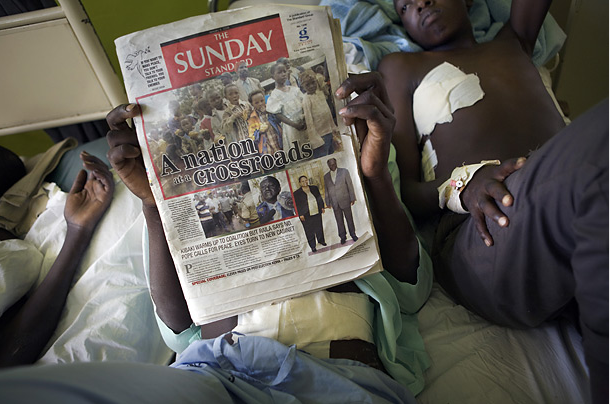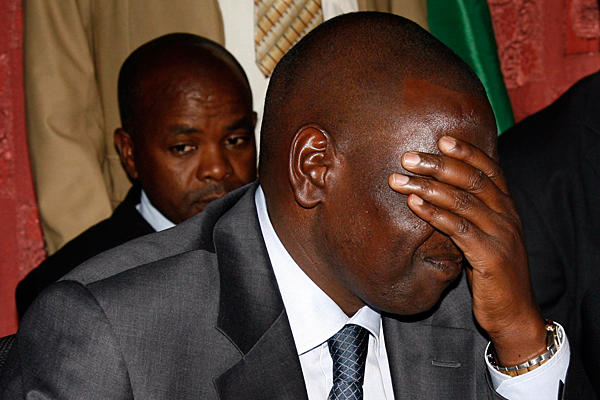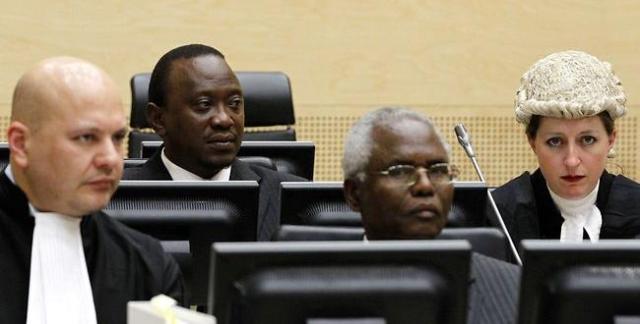Andrea Russell joins JiC for this fascinating guest-post on the potential implications of the ICC’s intervention on Kenya’s upcoming Presidential elections. Andrea teaches International Criminal Law at the University of Toronto Faculty of Law, where she also serves as Executive Director of the Office of the Dean.
For many, Kenya’s reputation as one of sub-Saharan Africa’s more stable nations was shattered by the post-election violence of five years ago. However, the horrifying atrocities that followed the general election of 2007 did not shock many long-time observers of Kenya’s political system who knew that similar violence, albeit on a less dramatic scale, has followed or preceded every general election since Kenyan multi-party elections began.
The introduction of a new catalyst in Kenya’s current general election campaign—the International Criminal Court (ICC) — nonetheless presents the welcome possibility of a clean break in the cycles of election violence in that country.
Upon the ICC’s creation in 1998, one of the Court’s more controversial features was the Prosecutor’s proprio motu powers enabling him, with the approval of the ICC’s Pre-Trial Chamber, to launch investigations in any Rome Statute member state upon his own volition. Having examined evidence that indicated systematic organization of the violence that plagued the 2007 Kenyan elections, the Court’s Prosecutor launched just such an investigation. Luis Moreno-Ocampo ultimately charged six individuals (the “Ocampo Six”), claiming they were responsible for organizing the ferocious violence which killed over 1,100 and led to the displacement of over 660,000 Kenyans. The charges against four of these individuals, confirmed by the Court early this year in two separate cases within the Kenya Situation, make for frightening reading.
In one of the two Kenya cases, Uhuru Kenyatta, son of the country’s first post-independence leader and current Deputy Prime Minister, together with then Head of the Public Service and Secretary to the Cabinet Francis Muthaura, are charged with using a Mafia and cult-like organization, the Mungiki, as well as the Kenyan police forces, to carry out murder, forced expulsion, and even forced circumcision of alleged supporters of their political rivals.
In the second case, Mr. Kenyatta’s former political rival, the former Minister of Higher Education of the country and current MP William Ruto is charged with similarly organizing a network of paid killers to murder and expel supporters of opposing parties, going so far as to recruit a well-known radio broadcaster, now his co-defendant, to fan the flames of violence on air. Their alleged goal was to create a unified voting block that would support their Orange Democratic Movement party.
Shockingly, not only are both Kenyatta and Ruto running for re-election in 2013, but the two former sworn rivals declared on December 4th that they have formed a new political alliance, raising the possibility that both the Presidential candidate and his running mate from the newly-formed Jubilee Alliance may be indicted international criminals. And in a rather astounding confluence of events, their respective trials are set to begin on April 10 and 11, 2013, mere weeks following the first election date in March, with April 11 being the very day scheduled for any required second round electoral run-off.
Allegations abound that Kenyatta and Ruto hope that their election may enable them to claim insufficient time to attend their trials, which could derail the proceedings given the Rome Statute’s requirement that the accused be present at trial. The four accused voluntarily appeared for preliminary hearings, and it seemed that the Court would be able to enjoy a Situation with relatively cooperative accused; however, prior cooperation does not guarantee continued willingness to return to The Hague, and at least some of the four may simply refuse to turn up for trial.
Kofi Annan, who coordinated the political settlement that ended the election violence five years ago, warned last week that Kenyans would all suffer if either Kenyatta or Ruto were to win leadership posts in the new government. Recent claims from members of the diplomatic community in Nairobi that they are now forbidden from engaging in all but emergency contact with the two Jubilee Alliance candidates belie these fears.
The charges against Kenyatta and Ruto allege that both individuals were indirect co-perpetrators in separate and rival organizational plans to attack supporters of each other’s parties, using their immense power and influence, as well as cash, to ensure the cooperation of hired killers. The Prosecutor’s charges paint a picture of meetings at which the acquisition of weapons and organization of transportation to the targeted areas were planned in detail, with Kenyatta and Ruto actively involved in their respective conspiracies. That said, close readers of the confirmation of charges decisions note that the current charges against both accused rely on the evidence of a very few witnesses—and in some context just one– and that these witnesses may have been bribed. Both accused are charged with the crimes against humanity of murder, forced displacement, and political persecution, with Kenyatta also facing additional charges of organized sexual violence. The forced circumcision and penile amputation charges against Kenyatta have been categorized as ‘other inhumane acts’, rather than the Prosecutor’s original characterization of these acts as sexual violence.
The Kenyan press has engaged in much hand-wringing in recent months over the implications of the cases to the country’s reputation. Polls find considerable support for both Kenyatta and Ruto, and at the same time substantial support for the ICC, leaving the outcome of the election truly in question. But while some, including both Kenyatta and Ruto, vehemently argue that the international community should stay out of Kenya’s internal affairs, others, including Kenyan human rights leaders, posit that the country’s political elites may finally be faced with an institution which they cannot intimidate.
In theory, the ICC introduces international oversight over internal affairs in countries where tensions threaten to explode into violence. ICC-sceptics, of course, argue that this oversight is virtually ineffective against countries which do not belong to the Court and which have veto-wielding friends on the UN Security Council. But Kenya’s 2013 elections could prove to be a crucial test not only for Kenyan political elites, but also for the ICC itself. Given the fact that violence broke out prior to or following every Kenyan multi-party general election to date— namely in 1992, 1997, 2002, and 2007— relatively peaceful elections in 2013 could suggest the deterrent capacity of the ICC. Unorganized, spontaneous, and largely tribal violence could of course break out, but a muting of the violence, or the less organized nature of such violence, might point to a new ‘ICC effect’.
Will the spectre of national leaders spending their years in power defending themselves in The Hague encourage voters to cast their votes against Kenyatta and Ruto? And will political leaders be deterred from coordinating the political violence that was allegedly planned in prior elections? Kenyans– and no doubt the ICC and its backers– will await the country’s 2013 elections with bated breath.





Pingback: IB Online (1/1): Eine kleine Netzschau « Bretterblog
point of correction,there was no violence in 2002.otherwise good work
Thanks for your feedback, ROW. I was basing my 2002 election violence claim on the Commonwealth’s 2002 General Elections Observation Group study, found here, with statistics on the 2002 violence (see particularly p. 13):
Click to access 63FCFC4C-2E1C-42DC-9C4A-BD65E96B240D_Kenya2002COGReport-web.pdf